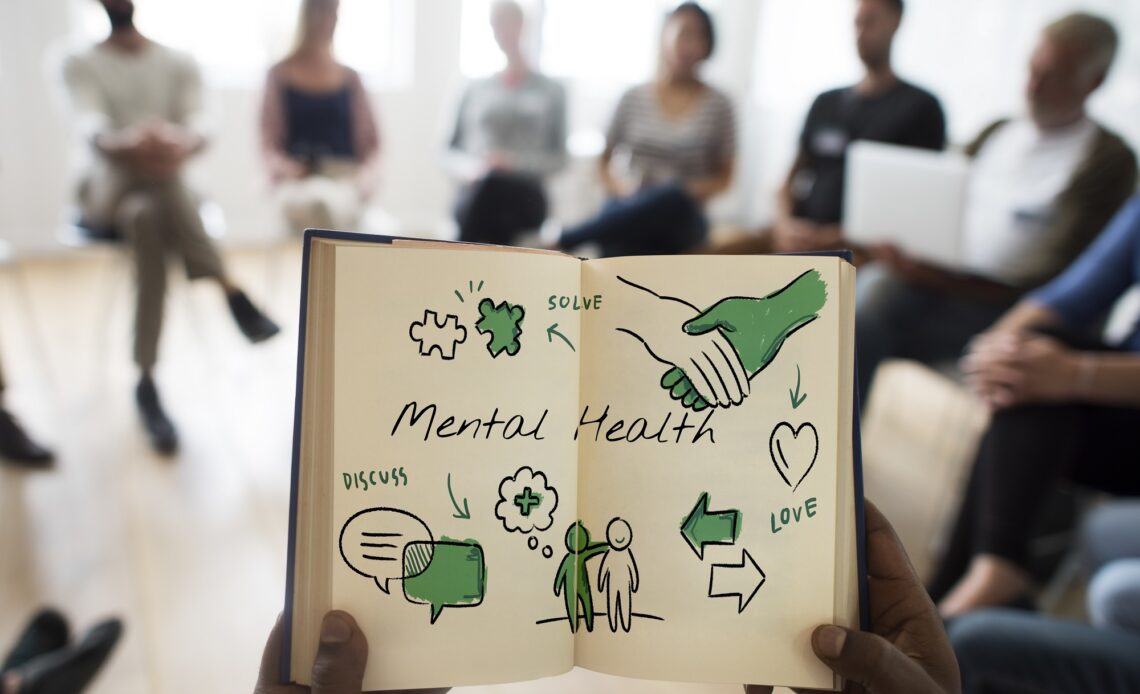Introduction
Mental health is an essential component of our overall well-being. It impacts our emotions, thoughts, and behaviors, and it plays a significant role in how we cope with stress, interact with others, and make choices in life. Achieving and maintaining good mental health is a lifelong journey that requires attention, care, and self-awareness. In this comprehensive guide, we will explore various strategies, tips, and techniques to help you achieve and sustain mental well-being.
Understanding Mental Health
Understanding mental health is a crucial foundation for maintaining and improving one’s overall well-being. Mental health refers to a person’s emotional, psychological, and social well-being, and it encompasses various aspects of a person’s life, such as their thoughts, feelings, and behaviors. Prioritizing mental health can positively influence the management and prevention of metabolic syndrome. Here, we’ll elaborate on key aspects of mental health, including common mental health conditions, factors that influence it, and the importance of professional help.

Common Mental Health Conditions:
Mental health can be affected by a range of conditions, some of which are common and well-recognized. These conditions may include:
- Depression: Characterized by persistent feelings of sadness, hopelessness, and a lack of interest or pleasure in activities.
- Anxiety Disorders: These encompass conditions like generalized anxiety disorder, panic disorder, social anxiety disorder, and specific phobias, which involve excessive worry, fear, and anxiety.
- Bipolar Disorder: Involves extreme mood swings, from periods of intense elation (mania) to deep depression.
- Schizophrenia: A complex condition involving distorted thinking, delusions, hallucinations, and difficulty in perceiving reality.
Factors Influencing Mental Health:
Several factors can influence an individual’s mental health, and understanding these factors is crucial for effectively managing one’s mental well-being. Some of these factors include:
- Biological Factors: Genetics, brain chemistry, and hormonal imbalances can play a significant role in mental health conditions.
- Environmental Factors: Stress, trauma, exposure to violence, or a challenging living environment can contribute to mental health issues.
- Psychological Factors: Personality traits, coping mechanisms, and self-esteem can affect how one deals with life’s challenges.
Importance of Seeking Professional Help:
Recognizing the signs of mental health issues and seeking professional help when needed is essential. Many individuals hesitate to seek help due to stigma, fear, or a lack of understanding. However, professional mental health support is crucial for several reasons:
- Expert Assessment: Mental health professionals can provide an accurate diagnosis, helping individuals understand their condition and its severity.
- Treatment Options: Professionals can offer a range of treatments, including therapy, medication, or a combination of both, tailored to an individual’s specific needs.
- Support and Coping Strategies: Therapy and counseling help individuals learn effective coping strategies, problem-solving skills, and techniques for managing their condition.
- Prevention and Education: Professionals can also provide education on mental health, stress management, and prevention strategies to enhance long-term well-being.
Building Resilience
Building resilience is a multifaceted process essential for effectively navigating life’s trials and tribulations. It is the capacity to not only endure but also to thrive in the face of adversity while safeguarding one’s mental well-being. This journey involves various interconnected strategies, such as fostering a positive mindset through constructive self-talk and optimistic outlooks, mastering problem-solving skills to navigate obstacles, and efficiently managing stress through mindfulness and time management techniques. It also entails the cultivation and nurturing of a robust support network, which provides emotional sustenance in challenging times. Resilience is not only about weathering the storm but emerging from it stronger and more equipped to confront future challenges, making it a fundamental cornerstone of mental and emotional health.
Self-Care and Self-Compassion

Self-care and self-compassion are vital pillars of maintaining robust mental health and well-being. It comprises a spectrum of mindful practices, from nurturing the body through exercise, supplements and proper nutrition to cultivating emotional balance with techniques like mindfulness and meditation. It recognizes that dedicating time and energy to oneself is not selfish but essential for mental and emotional resilience. Simultaneously, self-compassion encourages individuals to approach themselves with kindness, understanding, and forgiveness, fostering a harmonious relationship with one’s own self. This compassionate self-attitude embraces self-forgiveness and self-kindness while rejecting self-criticism, ultimately enhancing self-esteem and reducing emotional distress. Together, these principles remind us that prioritizing self-care and self-compassion is not only a personal right but a crucial step towards nurturing mental health and achieving a more balanced and fulfilling life.
Healthy Relationships
Healthy relationships play a fundamental role in shaping our mental health and overall well-being. They provide a sense of connection, support, and belonging, while also serving as a source of personal growth and emotional resilience. This chapter explores several key aspects of healthy relationships:
Setting Healthy Boundaries:
Setting boundaries is crucial for maintaining healthy relationships. It involves defining what is acceptable and respectful in the relationship and what is not. Healthy boundaries ensure that you maintain your individuality, feel safe, and prevent emotional exhaustion from overcommitting or tolerating unacceptable behavior.
Effective Communication Skills:
Effective communication is the cornerstone of any healthy relationship. It involves active listening, expressing oneself honestly and respectfully, and being open to feedback. Good communication fosters understanding, resolves conflicts, and strengthens the emotional connection between individuals.
Mutual Respect and Support:
In healthy relationships, there is a foundation of mutual respect where each person values the other’s thoughts, feelings, and needs. Support is freely given and received, providing emotional encouragement during both good and challenging times.
Trust and Vulnerability:
Trust is a key element of healthy relationships. Being able to confide in one another and share vulnerabilities without fear of judgment or betrayal creates a deep emotional connection.
Equality and Fairness:
Healthy relationships are characterized by a sense of equality, where both individuals contribute, make decisions together, and share responsibilities. It’s important that neither person feels dominated or marginalized.
Conflict Resolution:
Conflict is a natural part of any relationship, but in healthy relationships, conflicts are resolved constructively. This involves addressing issues openly, finding compromises, and working together to find solutions.
Personal Growth and Independence:
Healthy relationships promote personal growth and independence. Both individuals have the space to pursue their interests and goals while supporting each other’s endeavors.
Nurturing Supportive and Fulfilling Relationships:
It’s essential to nurture relationships that are supportive and fulfilling. Surrounding yourself with people who uplift and encourage you, and reciprocating that support, leads to greater mental and emotional well-being.
Recognizing and Addressing Toxic Relationships:
Recognizing the signs of toxic or unhealthy relationships and having the courage to address them is also a crucial aspect of maintaining mental health. Sometimes, ending or distancing oneself from such relationships is necessary for self-preservation.
Coping with Stress and Anxiety
Coping with stress and anxiety is essential for maintaining good mental health, as these challenges are ubiquitous in our lives. Stress can be a response to external pressures and demands, while anxiety often involves excessive worry and fear about the future. To effectively manage and reduce stress and anxiety, a combination of strategies and techniques is necessary:
Relaxation Exercises:
- Deep Breathing: Practicing deep, diaphragmatic breathing can calm the body’s stress response, reduce muscle tension, and promote relaxation.
- Progressive Muscle Relaxation: This technique involves tensing and then relaxing various muscle groups, which can help alleviate physical tension.
Mindfulness and Meditation:
- Mindfulness Practices: Mindfulness involves staying present in the moment and accepting it without judgment. Mindfulness meditation and activities like yoga can reduce anxiety by redirecting focus from future concerns to the present.
- Meditation: Regular meditation can increase emotional resilience, reduce anxiety, and promote a sense of calm and clarity.
Time Management:
- Prioritization: Effective time management involves setting priorities, organizing tasks, and allocating time to what’s most important, which can prevent feelings of being overwhelmed.
- Breaks and Self-Care: Scheduling regular breaks and self-care activities into your routine can help reduce stress and prevent burnout.
Physical Activity:
- Exercise: Regular physical activity releases endorphins, which are natural mood lifters. Exercise can reduce stress and anxiety, improve mood, and boost overall mental well-being.
Cognitive Behavioral Therapy (CBT):
- Identifying Thought Patterns: CBT helps individuals recognize and challenge negative thought patterns and cognitive distortions that contribute to stress and anxiety.
- Problem-Solving: CBT provides problem-solving skills to address sources of stress and anxiety more effectively.
Social Support:
- Talk to Friends and Family: Sharing your concerns and feelings with trusted friends and family can provide emotional support and a fresh perspective.
- Support Groups: Joining support groups with individuals who share similar experiences can be beneficial for understanding and managing stress and anxiety.
Relaxation and Stress-Reduction Apps:
Several apps are available that offer guided relaxation exercises, meditation, and stress management tools, which can be easily accessed on mobile devices.
Professional Help:
In cases where stress and anxiety become overwhelming or debilitating, seeking professional help from a therapist or counselor is essential. They can provide tailored strategies, coping mechanisms, and, if necessary, medication to manage symptoms.
Getting Quality Sleep
Getting quality sleep is a cornerstone of mental health and overall well-being. Sleep serves as a restorative and essential process, enabling the brain to consolidate memories, regulate emotions, and repair the body. Good sleep hygiene practices, such as maintaining a consistent sleep schedule, creating a comfortable sleep environment, and avoiding stimulants like caffeine and electronic screens before bedtime, are crucial for improving the quality and duration of sleep. Adequate and restful sleep not only helps in reducing the risk of mood disorders like depression and anxiety but also enhances cognitive function, decision-making, and problem-solving abilities.
Mindfulness and Meditation
Mindfulness and meditation are transformative practices that offer profound benefits for mental health and overall well-being. This involves being fully present in the moment, observing thoughts and emotions without judgment, which can help reduce stress, anxiety, and emotional reactivity. Meditation encompasses various techniques that focus the mind and promote relaxation, such as mindfulness meditation, loving-kindness meditation, and transcendental meditation. These practices enhance self-awareness, emotional regulation, and the ability to manage stress effectively. By cultivating mindfulness and incorporating meditation into daily life, individuals can develop a greater sense of inner calm, resilience, and a deeper connection to themselves, ultimately improving their mental health by reducing symptoms of anxiety and depression and fostering a more positive and balanced outlook on life.
Seeking Professional Help
Seeking professional help is a pivotal step in promoting and safeguarding one’s mental health. It acknowledges that some challenges and conditions may surpass self-help strategies, emphasizing the importance of expert guidance. Professionals, such as therapists, counselors, psychiatrists, and psychologists, offer a range of therapeutic approaches tailored to an individual’s specific needs. These professionals can provide expert assessment and diagnosis, offer evidence-based treatments, and create a safe, non-judgmental space for individuals to explore their thoughts, emotions, and concerns. Seeking therapy or counseling is not a sign of weakness but a courageous act of self-care and self-awareness. It can lead to significant improvements in mental health, helping individuals gain insights, develop coping skills, and work through challenges they may be facing.
Reducing Stigma
Reducing the stigma associated with mental health is a critical aspect of promoting understanding, acceptance, and access to mental health services. Stigma often stems from misconceptions and negative stereotypes surrounding mental health conditions, leading individuals to feel ashamed or reluctant to seek help. This chapter highlights the significance of destigmatizing mental health issues and provides guidance on becoming an advocate for mental health awareness:
- Education and Awareness: Understanding mental health conditions and sharing accurate information is vital. It can help dispel myths and misconceptions, fostering a more empathetic and informed society.
- Open Conversation: Encouraging open dialogue about mental health is essential. Discussing personal experiences and encouraging others to do the same can normalize the conversation and break down the barriers of stigma.
- Language Matters: Promote the use of respectful and non-stigmatizing language when discussing mental health. Avoid derogatory terms and stereotypes that perpetuate negative beliefs.
- Support and Empathy: Offer support and empathy to individuals struggling with mental health challenges. Demonstrating compassion can reduce feelings of isolation and shame.
- Advocacy: Participate in or support mental health advocacy organizations and initiatives that work to change public policies, improve access to care, and fight stigma at a broader societal level.
- Self-Disclosure: When appropriate and comfortable, sharing your own experiences with mental health can be a powerful tool in reducing stigma. It humanizes the issue and lets others know they are not alone.
- Media and Entertainment: Encourage responsible portrayals of mental health in media and entertainment, as these platforms have a significant impact on public perception.
- Access to Care: Advocate for better access to mental health services and work towards reducing barriers, such as cost and location, to ensure that everyone can access the help they need.
Maintaining Mental Health in the Long Term
Maintaining good mental health over the long term is a lifelong journey that involves ongoing self-awareness, self-care, and resilience-building. It entails the consistent practice of the strategies and techniques discussed throughout this guide, such as self-care, self-compassion, and stress management, to create a robust foundation for emotional well-being. Additionally, fostering and nurturing healthy relationships, seeking professional help when needed, and actively reducing the stigma surrounding mental health are enduring efforts. Building and preserving mental health is a dynamic process that requires adaptability and a willingness to learn and grow throughout life. By consistently applying these principles and remaining attuned to your emotional needs, you can cultivate enduring mental well-being, navigate life’s challenges with greater ease, and enjoy a more fulfilling and balanced existence. Remember that maintaining mental health is not only a personal journey but a shared responsibility within our communities and society as a whole.
Conclusion
Good mental health is an invaluable asset that impacts every aspect of your life. By understanding the basics of mental health, practicing self-care, building resilience, nurturing healthy relationships, and seeking support when needed, you can achieve and maintain a positive and fulfilling mental well-being. Remember, it’s a journey, and small, consistent steps can lead to significant improvements in your mental health over time.


